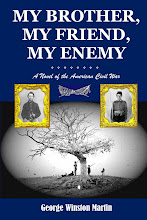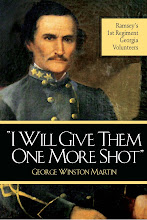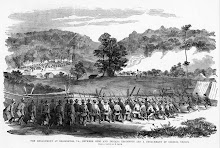![]() |
| Death of General Garnett at Corricks Ford |
Early in the morning, General Garnett orders the army to cross Kalers Ford and head northward down the Shavers Fork Valley. Garnett moves ahead with his leading regiments, leaving the Twenty-Third Virginia and Ramsey’s First Georgia as rear guard to protect the wagon train. Cavalry scouts report that Union troops (Captain Benham’s pursuit force) are coming up fast behind. In an attempt to ambush the Federals, Colonel Ramsey divides the First Georgia, ordering Major George Harvey Thompson to place the better part of six companies, some 300 men, in hiding along the far side of the Shavers Fork Valley. Ramsey positions his remaining four companies at the northern end of the valley to await the Federal attack. Thompson conceals his soldiers in a corn field as they wait to spring the trap.
Splashing across Kalers Ford, the Union soldiers move down the valley toward Colonel Ramsey’s position. Through an incredible piece of bad luck, the Federal troops align themselves in such a way as to remain out of range of the smoothbore muskets of Thompson’s detachment, cutting the major and his men off from the rest of the regiment.
Colonel Ramsey, fighting desperately against overwhelming numbers, is forced to order a retreat. The Union column, unaware of the presence of Thompson’s detachment, presses forward in pursuit. At Corricks Ford, Colonel William B. Taliaferro positions his Twenty-Third Virginia, the remnants of the First Georgia and two artillery pieces on a bluff overlooking the river. After a fierce battle lasting about half an hour, Taliaferro is running low on ammunition and orders a withdrawal.
General Garnett meets Taliaferro at the next ford, ordering him to continue his retreat while the general remains with just twenty sharpshooters. When Union troops threaten to swallow up this tiny force, Garnett orders a retreat, but he is shot and killed, becoming the first general officer on either side to be killed in the war.
The Army of the Northwest, now little better than a panic-stricken mob, continues its retreat northward toward Red House, Maryland. Captain Benham halts his pursuit at Corricks Ford to rest his men and wait for General Morris to arrive with the rest of his brigade.
Back at Kalers Ford, the Major Thompson and his six companies, now completely cut off, work their way up the mountain to their east, attempting to find a route back to their army. Before long, the soldiers are completely lost in the wilds of the Allegheny Mountains.
.jpg)










